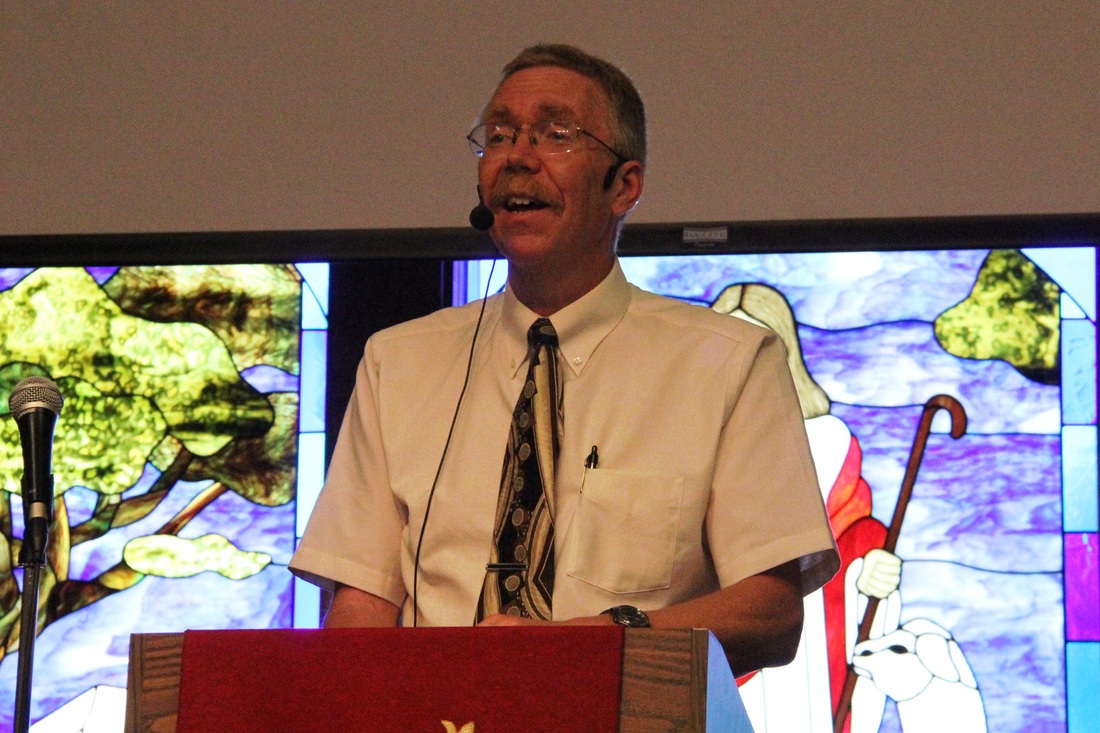
What is the shape of love? In this scripture we are given a godly shape of love. Love looks like the Good Samaritan who bandages the wounds of the helpless. This story told by Jesus is perhaps the best known story of the Bible. Many people don’t even know what a Samaritan is, but the phrase, “The Good Samaritan” has become iconic. Hospitals, nursing homes, churches take on the name Good Samaritan, indicating the desire to bind up wounds, care for the weak, nurse the sick.
I love the encouragement to love others, to give… There’s a meaningful wrinkle to this story, however, most people miss. The lesser application of helping others, is awesome. But there is something more important.
This intent of the question is good, but it misses the mark: “What must I DO? To inherit?” Christianity is not a religion of works, like you need to knock on a quota of doors, or give away a certain number of bags of clothing. I could be wrong, but I think I overheard Dorothy Bronkema highfiving Bernita Bronkema after a busy day in the Clothesline ~ “Hey Bernita, good for us, we gave away 50 bags of clothes today, that means we are that much closer to making it to heaven! Woo hoo!”
The story of the Good Samaritan is a parable primarly about salvation and eternal life. Most people focus on the inspiring aspect of the story to be like the Good Samaritan and do good for others. It’s good to do good. But that is not the main point. The question about who is my neighbor is the second question, the primary question is about salvation. Only one person in the story is SAVED. It’s not the priest. It’s not the Levi. It’s not the Good Samaritan. It is the Helpless, naked, bleeding man that is left on the side of the road to die.
What must I do to inherit eternal life is the question that starts it all. DO????? You and I cannot do anything. We are like the dying helpless man. The only thing we can “DO” is rely on a Good Samaritan to rescue us. While we are still sinners, while we are helpless, while we cannot do anything to save ourselves, along comes ONE to bandage our wounds, put us on his own donkey, and restore us to life. Jesus Christ is the ultimate Good Samaritan; we are the helpless dying man on the side of the road that can DO NOTHING to help ourselves.
The Expert in the law has a problem. It’s not a HEAD problem needing a better explanation of what it means to trust God ~ it is a HEART problem. Jesus is a master at getting people to work out their thoughts and ideas so their heart can be transformed. Jesus answers the experts question with a question: READ Luke 10:26. The Expert answers by quoting the first and second greatest commandments. READ Luke 10:27. “Follow that command perfectly and you’ve got eternal life” Jesus says. The problem: no earthly man or woman can obey the command to love others perfectly. People work hard to do good/be good ~ deep down, they know it is not enough. The best marriages are those when both husband and wife know they do not deserve the other. There is a humility. Doing good is never good enough.
The expert can’t let it go… His heart problem is revealed in Luke 10:29 READ. He wanted to justify himself. Even though all the right answers have been given the “expert” is losing the debate…. He wants to justify himself to show that he in.
When it comes to salvation, self assessment isn’t what counts, it’s God’s call! I think I’m kind of a funny person, but your opinion is more important in deciding you should laugh. What I may think is a funny joke you may see as annoying. We justify ourselves all the time. It’s not my fault I was late. I tried hard to finish the task, but it was too much. I am a nice person. This is why I deserve...
excuses… I’m a victim…. I love telling stories with me as the hero… Jesus seems to have hit a nerve with this man’s ideas of what it takes to make it to heaven, so he wants to justify himself… “Who is my neighbor” he asks in Luke 10:29. The man likely had a long list of good things he’d done for people, what a nice person he was, many generous acts of compassion, giving away money to the poor….
Jesus’ answers with the story of the Good Samaritan: A man is beat and left for dead. First a priest then a levite pass by without helping, two groups of upstanding people the Expert could relate too. Jesus is emphasizing how impossible it is to justify our own righteousness because we miss so many opportunities… He’s challenging the idea of earning your salvation by doing good things.
Along comes a Samaritan. The rivalry of the Samaritans and the Jews goes back centuries….**** [See note at end of this message for a brief explanation of the Samaritans.] From a Jewish perspective the Samaritans are black sheep of Israel’s family…. They are mudbloods from a Jewish point of view, impure. The shocking statement of the story: “But a Samaritan, as he traveled, came to where the man was….he took pity on the man.”
Here is a modern telling of the story trying to capture the shock of a cursed Samaritan being the hero of compassion: “A man was half dead on the side of the road. Pastor Carl passed by the man. Elder Jim passed him by. And along came a Muslim cleric who took pity on him.” The point of the story: doing good is a good thing to do, but all of us fall short of doing good perfectly, and thankfully doing good is not what gets you into heaven. Doing good for others is universal. People that are unlike us do good and positive things for others in the world. The Shape of love is a helping hand.
The conversation with the Expert is left unfinished. The question that started it all was about eternal life. Then it became who is your neighbor. Jesus ends the story with a question a three year old would be able to answer: READ Luke 10:36. the answer is quite obviously the Samaritan. In a funny detail, when the expert answers Jesus, he doesn’t say the word Samaritan: READ Luke 10:37a.
The conversation ends with a challenge. READ Luke 10:37b. That is no dif-ferent from what Jesus said in Luke 10:28 after the expert gave his first answer about doing good. This is a hollow ending to the conversation, because with this story Jesus has managed to demonstrate that doing good is not for the in crowd, the expert in the law, the Jewish priests, the pastors…. In order to complete the conversation, the expert needed to go back to the original question, “what must I do to inherit eternal life?” He chooses to drop the conversation.
But we can answer. God wants us to be a good neighbor to people. He wants us to help the weak. But that doesn’t get us salvation. As Christians Doing good means we get to have fun in this old world. When we feed the hungry our role is the same as that described in last week’s message described in Luke 10:1 READ. As Christians, The Good Samaritan ministry is a ministry of preparation ~ a shadow of the greater good when Jesus Christ enters the lives of people in fullness. Our purpose in helping others is not to earn our salvation, but to do the work of God as a foreshadowing of the greater work that is coming when salvation and wholeness is offered to the hurting.
Our understanding of being a good Samaritan is also given perspective in Luke 10:20 when the disciples return from their mission trip and report what a joy to see lives changed and people transformed. Jesus cautions READ. A healthy perspective keeps our good works in check, we can never do enough good to earn salvation. May our greatest joy be the salvation of our soul, the hope in Christ through forgiveness. The entire thrust of the book of Luke at this point is that Jesus is on a steady pace towards Jerusalem where he will suffer and die on the cross for the forgiveness of your sins.
The most important application of the Good Samaritan is found when we see ourselves as the naked man half dead on the side of the road. When we at last understand we can do nothing to earn our salvation. An important detail is the Samaritan offering to pay the full price to the innnkeeper, for it keeps the half dead man from slavery. If you owed a debt in those days, repayment could come in the form of slavery. One person said it this way: "Jesus comes along when nobody else stops and nobody else can heal you, he takes you up. He carries you. And he pays the entire shot, not only the short term debt but the long term debt so that you will not be enslaved. He pays for it all himself, and he goes after the despised and the broken and the bleeding and the dead when nobody else does, as he goes on the way to the cross" (D.A. Carson).
What is the shape of love? Love takes the shape of a cross. Doing good things for others is wonderful and awesome, it makes the world a better place, and boy do we need that in this old troubled world…. Goodness is not the excusive domain of Christians. On this week of Thanksgiving, may we take a deeper step beyond helping others, not seeking to make ourselves feel good by the good things we do, not self justification, but seeing ourselves as the needy person that is left for dead, totally dependent on Jesus Christ, the ultimate Good Samaritan.
Help others. It’s a great joy. Even when it’s hard. You truly are entering the work of preparation for Christ to come to those whom you serve. But greater satisfaction comes when you submit your life to the Lord Jesus Christ, when he bandages your wounds, heals your sickness and carries you to safety. The shape of love is a cross. Amen.
_________________________________________________
*** Comment on background to the Samaritans: Back in the centuries old history of the Jews, in the days when they still had twelve distinct tribes of Israel, Israel was a divided nation with one Kingdom in the North, Israel, made up of 10-11 tribes, and another in the South, Judah, made up primarily of the tribe of Judah (that’s where we get the name “Jew”). The Assyrians rose up as the world power 700-800 years the birth of Jesus Christ. They conquered the Kingdom of the North. Judah did not fall at that time. The Assyrians were ruthless and decided to wipe the northern tribes off the face of the earth by intermarrying with them, thus polluting the blood lines. Those people became known as Samaritans, named after the capital of the region, Samaria. The Samaritans consider themselves descendants of Israel and follow the law as given to Moses.


 RSS Feed
RSS Feed